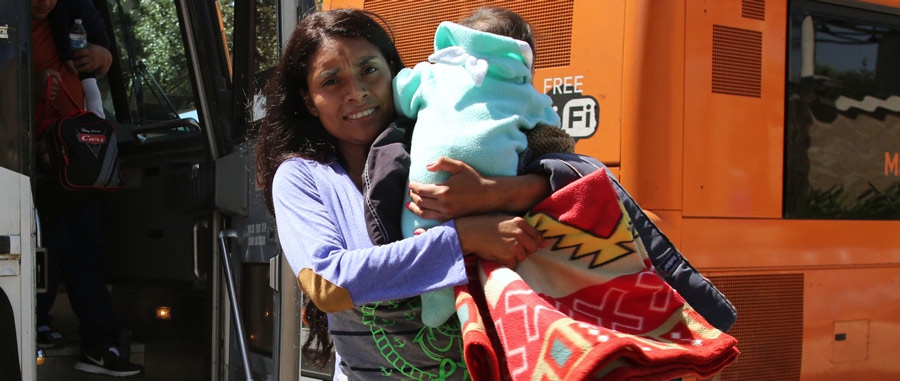The views expressed in our content reflect individual perspectives and do not represent the authoritative views of the Baha'i Faith.
A while ago, I witnessed an exchange between two members of a panel discussion on the “caravans” of refugees from Central and South America that had once dominated the 24-hour news cycle.
Panelist A described watching a report in which a refugee child fell prostrate from heat exhaustion. For her, she said, it would always be “humanity first.”
Panelist B responded: “We are also a nation of laws and borders, which is part of my problem with the way some of this is being spun.”
Both of the panelists identified as Christians. This allegedly means they believe that God is revealed through Jesus Christ. One would assume, therefore, that they 1) believe in God, and 2) believe Christ’s teachings to be the Word of God, and any commandments he gives to be divine law. At least, this was my understanding of the Christian faith I grew up in, just as it forms my understanding of the Baha’i teachings: “Should anyone seek refuge with you, extend unto him your protection and betray him not.” – Baha’u’llah, The Summons of the Lord of Hosts
Leaving aside the fact that these refugees are repeatedly referred to as “Illegal aliens” when they have as of yet done nothing illegal, and have expressed no intention of doing anything illegal, I had to wonder what sort of “spin” one might put on human suffering that a professing believer would find problematic.
Is stating, as Panelist A did, that she put humanity first merely “spin?”
A lesson from Christ’s ministry applies directly to this situation. It’s in the book of Luke (chapter 10, starting at verse 25); in it Christ reveals – in answer to a direct question – the core of his teaching about the salvation of the human soul. Most Bibles label this “The Parable of the Good Samaritan.” I’ve written of it before in different contexts because it is unique in the way Christ uses it to quadruply emphasize what he identifies as God’s primal Law. He did this through:
- verbally establishing its primacy
- repetition
- illustration, and
- direct instruction.
The question Christ answers is pivotal to Christian belief: “What must I do to have eternal life?”
Christ answered by asking the petitioner, a scholar of religious jurisprudence, what is written in Jewish law. The young lawyer replied: “ ‘You shall love the Lord your God with all your heart, with all your soul, with all your strength, and with all your mind, and your neighbor as yourself.’ ”
Christ’s response is direct and clear: “You have answered correctly. Do this and you shall live.”
Christ unambiguously linked eternal life with what we do with respect to our fellow human beings. He also confirmed the primacy of these two laws, originally given by Moses. In other instances, Christ repeated these laws and stressed their primacy yet more by adding, “On these two commandments hang all the Law and the Prophets.” -Matthew 22:40.
So of all God’s laws, these two take precedence.
The young legal scholar wasn’t satisfied, and asked Christ a second question: “And who is my neighbor?”
In response, Christ told the story of a Samaritan who saved the life of a severely wounded Jew when a Jewish priest and a Levite would not. The Samaritan not only takes personal responsibility for this man, despite their religious, ethnic, and cultural antipathy, he pays someone to care for him by proxy. At the conclusion of the story, Christ asked the young lawyer: “So which of these three do you think was neighbor to him who fell among the thieves?”
The answer is obvious: “He who showed mercy on him.”
Christ then put the finishing touch on his lesson; he gave a second direct commandment: “Go and do likewise.”
The Parable of the Good Samaritan applies directly to the disagreement between the two Christian panelists over the refugee crisis, because it is both a story of humanity and a story of laws and borders.
Laws and borders were why the priest and the Levite refused to help the dying man, even though he was a countryman and a fellow Jew. They did this in fear of crossing boundaries of ritual purity imposed on them by Jewish law.
The Samaritan was also bound by laws and borders – specifically, borders between Jew and Samaritan that were ancient, abiding, and rooted in theological differences. His religious leaders had set strict boundaries between Samaritans and their despised neighbors, the Jews, whom they regarded as heretical, apostate, unclean. They were not to cross through Jewish territory, nor consort with Jews in any way. The hatred was mutual; to the Jews of that time, the Samaritans were heretical “dogs” – vermin who pilfered scraps from the table of their betters.
Unlike the two Jews in Christ’s scenario, the Samaritan acted on God’s word – that love of his neighbor was a primal commandment. The Samaritan’s act was not one of defiance, but a recognition that God’s commandment to put humanity first took precedence over any other laws.
One more observation about that dual law: By binding the commandment to love Him and love one’s neighbor together, God put love for our fellow human beings on a par with love for Him. The two laws are inseparable.
So, this is the true religious context of the disagreement between the two panelists. Panelist A advocated for the behavior of the Samaritan in Christ’s illustration, which Christ unequivocally endorsed when he said, “Go and do likewise.” Panelist B endorsed the behavior of the Levite and the priest. In her version of the parable, the two co-religionists of the dying man were in the right, practicing a higher virtue by upholding their laws and borders over God’s command to put humanity first.
As I read and prayerfully meditate on Christ’s lesson in Luke, I must ask if he does not demand more of us. Christ wanted us to see ourselves as a people obedient to the law upon which all others depend – to put humanity first. The Baha’i teachings certainly verify and support that basic tenet:
O Children of Men! Know ye not why We created you all from the same dust? That no one should exalt himself over the other. Ponder at all times in your hearts how ye were created. Since We have created you all from one same substance it is incumbent on you to be even as one soul, to walk with the same feet, eat with the same mouth and dwell in the same land, that from your inmost being, by your deeds and actions, the signs of oneness and the essence of detachment may be made manifest. Such is My counsel to you, O concourse of light! Heed ye this counsel that ye may obtain the fruit of holiness from the tree of wondrous glory. – Baha’u’llah, The Hidden Words
















Comments
Sign in or create an account
Continue with Googleor